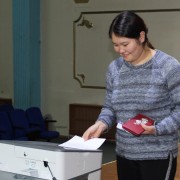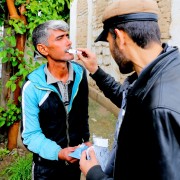Speeches Shim

In continued efforts by the U.S. government to assist the Kyrgyz Republic in the fight against COVID-19, on November 25 the United States Agency for International Development (USAID) handed over six high-capacity oxygen concentrators to five hospitals in Bishkek, Chui, and Osh. These state-of-the-art, lifesaving devices will supply the hospitals’ intensive care units with purified oxygen, which is critical for COVID-19 patients with severe symptoms. This equipment was handed over as part of USAID assistance to the Kyrgyz Republic in the fight against the COVID-19 pandemic at a virtual ceremony hosted by U.S. Ambassador Donald Lu.

More than 1,500 survivors of domestic and gender-based violence received social and psychological support from civil society organizations (CSOs) funded by the United States Agency for International Development’s (USAID) Jigerduu Jarandar project.

Today, the U.S. Embassy in the Kyrgyz Republic announces the intention of the United States, through the U.S. Agency for International Development (USAID), to provide timely assistance for the upcoming presidential and parliamentary elections in the Kyrgyz Republic in support of the Kyrgyz people as they choose their next representatives in government.

The U.S. Agency for International Development (USAID) has published a detailed Directory of Central Asian Horticulture Exporters to provide key information on local producers to potential buyers around the world, in order to help Central Asian agricultural products reach new markets. The directory is intended for use by horticulture importers, distributors, retail buyers, and international trade fair organizers.

The United States Agency for International Development (USAID) donated 285,000 children’s books to more than 1,000 public schools and libraries across the Kyrgyz Republic. These books include 45 new and adapted titles in Kyrgyz and Russian languages appropriate for primary grade students. The official handover ceremony took place today at the Bayalinov Library with the participation of the Deputy Minister of Culture, Information, and Tourism Mr. Kairat Imanaliev, USAID/Kyrgyz Republic Acting Mission Director Ms. Alder Bartlett and Director of the Pre-School, Basic and High School Education Department of Ministry of Education and Science Marat Usenaliev.

The United States Agency for International Development (USAID) has awarded $230,000 in grants to eleven civil society organizations (CSOs) in the Kyrgyz Republic to protect and support survivors of gender-based and domestic violence during the COVID-19 pandemic. These funds will be used to expand shelters, provide psychological and legal support to victims, and enhance other efforts in this field across the Kyrgyz Republic. These grants are provided through the USAID Jigerduu Jarandar project.
The U.S. government, through the United States Agency for International Development (USAID), is providing more than 190 million soms ($2,500,000) to support the Kyrgyz Republic’s response to the ongoing COVID-19 pandemic. This funding will improve infection control in health care facilities, testing, diagnosis, and help inform the public about risks of COVID-19. These priority areas and interventions were designed in consultations with the Ministry of Health and the Government of the Kyrgyz Republic.

In the last five years, the USAID Central Asia HIV Flagship Activity helped conduct over 57,000 HIV tests in Kyrgyzstan, identifying more than 1,200 previously undetected cases of HIV infection. Through this project’s support, more than 2,000 people living with HIV started or restarted their life-saving treatment. The project held its online closeout conference today, announcing these and other results from the last five years of work.

The U.S. government, through the United States Agency for International Development (USAID), is granting more than 66 million soms ($913,000) to three specialized organizations to increase the Kyrgyz Republic’s ability to respond to the ongoing COVID-19 pandemic. The focus will be on infection control, disease prevention, detection, diagnosis, treatment, and public information. These priority areas and interventions were designed in consultations with the Ministry of Health and the Government of the Kyrgyz Republic.


Comment
Make a general inquiry or suggest an improvement.